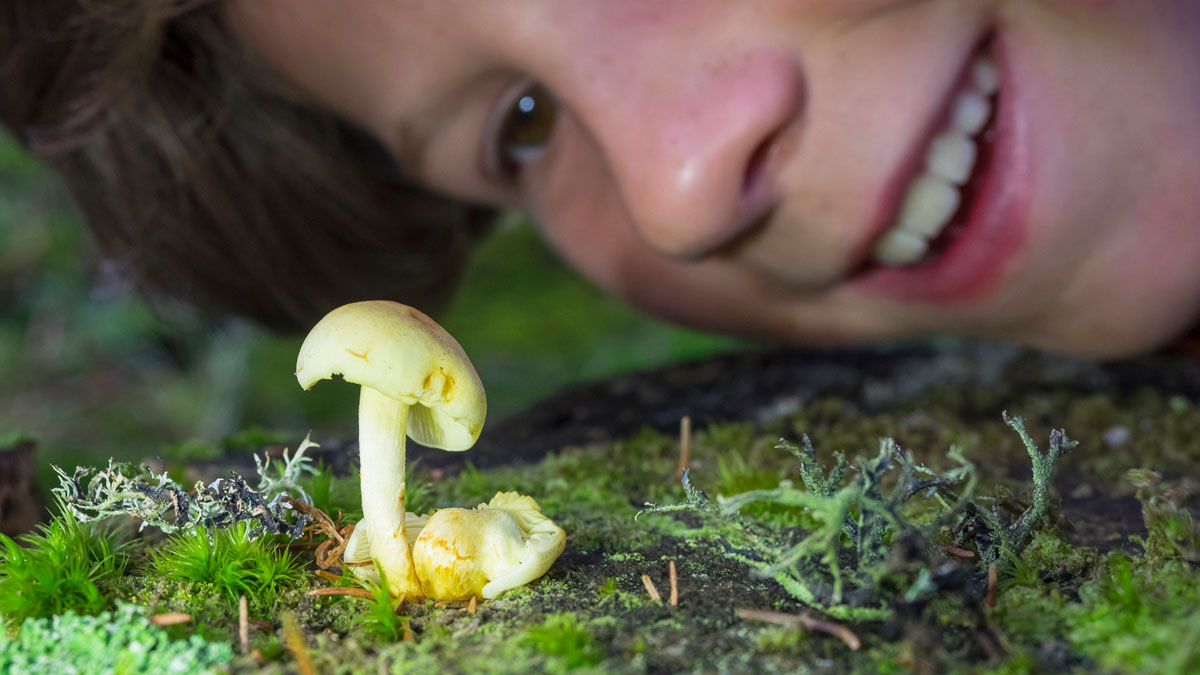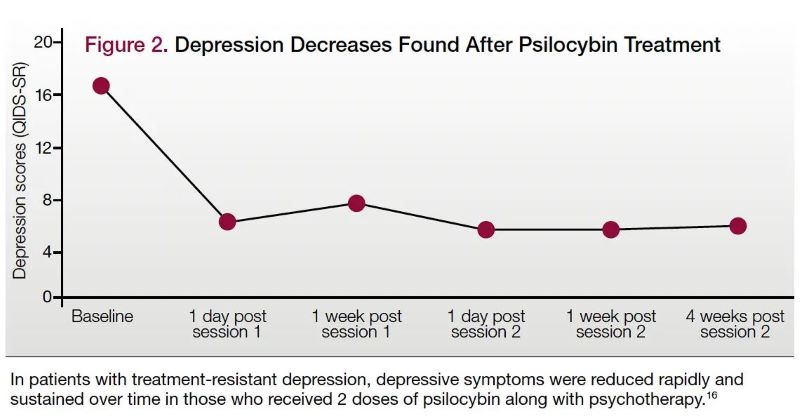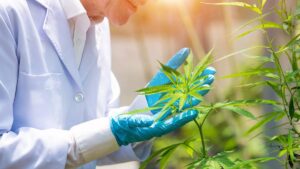MDMA and magic mushrooms have arrived: Australia lets psychs find a new way for happy to fight sad

*please don't eat this mushroom. Picture: Getty Images
What a time to be alive.
As the clock struck midnight to herald the start of the 23/24 financial year, Australia’s ability to legally prescribe through qualified medical practitioners MDMA (ecstasy) and psilocybin – the active ingredient in magic mushrooms – became a reality.
A surge in recent research is demonstrating that psychedelics-assisted therapy holds great promise for helping people with a range of existing-treatment resistant conditions.
The products are now legitimised by the Australian federal government as a proven aid in the treatment of post-traumatic stress disorder (PTSD), depression and other mental health issues in what could well be the future of therapeutic aids for these types of ailments – and possibly more.
MDMA is typically prescribed for PTSD and psilocybin for depression, anxiety and alcohol use disorder, while both also have potential uses in the field of palliative care, for patients in the end stages of terminal disease.
In preparation for this fairly momentous day, a handful of ASX-listed medicinal providers have diversified and readied themselves to help supply and service this relatively brand new industry, including Melodiol Global Health (ASX:ME1), Incannex Healthcare (ASX:IHL), MGC Pharmaceuticals (ASX:MXC), and Bioxyne (ASX:BXN).
But first, some facts
In an updated announcement, the Australian Therapeutics Administration (TGA) has stated that psychiatrists can be authorised to prescribe products containing 3,4‑methylenedioxy‑methamphetamine (MDMA) and psilocybin for use in psychedelic-assisted psychotherapy to treat specific mental health conditions.
“MDMA may be prescribed for the treatment of post-traumatic stress disorder (PTSD) [and] psilocybin may be prescribed for treatment-resistant depression (TRD),” the federal government body wrote.
“For these specific uses, psilocybin and MDMA have been listed as Schedule 8 (controlled drugs) medicines in the Poisons Standard.”
This is backed up outside Australia by, among others, ground-breaking research in the US by John Hopkins University that said while recent data has been limited by time constraints in recent years, there were undoubtedly positive outcomes for the use of both MDMA and psilocybin in treating depression and post-traumatic stress.

It’s not new
A mere ~60 years ago – and for thousands of years before then – humanity has grown exponentially due to our across-the-board curiosity and experimentation with drugs such as psilocybin or more recently MDMA as medicinal treatments.
It’s been proven, and again reported here recently by the New York Times, that early humans used psychedelics such as ergot and magic mushrooms – both of which contain psilocybin – for ritual use.
Some researchers believe that use of these psychedelics enabled early humans to harness and modernise tools for hunting and gathering, and other scientific progression.
In more modern times, especially in the wake of World War II, there was a boom in productivity across many sectors such as science, communication, medicine, technology and more, and that era of prosperity in the West helped burgeon experimentation with different types of drugs for therapeutic use.
Rightly or wrongly at the time, governments and psychiatrists across the globe experimented with and even legally prescribed substances such as MDMA and psilocybin during that era.
Then the ‘war’ began
At the same time, the beginnings of what we now call the War on Drugs were rumbling out of the White House, with US President Richard Nixon quite famously demonising what could have been a major step forward in pharmaceutical treatment.
That’s a long, and aggravating, story – but the gist of it is that Nixon and his cronies used their political might to turn the US, and by extension most of the developed world, against certain substances in order to divide communities.
Before he was President, Nixon led the establishment of the Drug Enforcement Administration to unite all law enforcement agencies for an “all-out, global war on the drug menace” in 1973 based on perceived political threats.
The doors to labs around the world were effectively slammed shut, with scientific investigations into the beneficial aspects of certain compounds essentially outlawed, and the research ground to a halt.
“The Nixon campaign in 1968, and the Nixon White House after that, had two enemies: the antiwar left and Black people,” former White House Counsel under Nixon, John Erlichmann, said.
“You understand what I’m saying? We knew we couldn’t make it illegal to be either against the war or Blacks, but by getting the public to associate the hippies with marijuana and Blacks with heroin, and then criminalising both heavily, we could disrupt those communities.
“We could arrest their leaders, raid their homes, break up their meetings, and vilify them night after night on the evening news. Did we know we were lying about the drugs? Of course we did.”
It’s been 50 years since then, countless trillions of dollars have been spent suppressing access to substances like MDMA and psilocybin, but the black market sales and unregulated abuse of them didn’t stop.
MDMA became a mainstay of the party scene during the 1990s, leading to a further crackdown from governments around the world, hampering research efforts as there were very few people in positions of power who were willing to appear “soft on drugs”.
However, over the past decade, the “all drugs are evil” mantra has begun to lose its power.
Most of us reading this were already adults when discussion around about the legality and yes/no beneficial properties of marijuana’s active ingredient THC for a plethora of life-changing and life-saving applications really took off.
Fast forward to today, and those developments in the field of cannabis have paved the way for a broader acceptance that compounds like MDMA and psilocybin aren’t just for hippies and loved-up ravers.
The floodgates are opening. Scientific research has been revisited from 60 years (and even more) ago, reinforcing the historical data of the efficacy of the now importable, licensable and prescribable therapeutic benefits from psilocybin and MDMA.
As the changing perceptions and acceptance of cannabis has shown, a well-informed population will happily embrace things that were once heavily demonised.
At the time of writing, 23 US states – the birthplace of the War on Drugs – have legalised cannabis use, and in another 8 US states it’s been decriminalised.
Australia is yet to follow suit, but for many who believe it should be legal, their once “impossible dream” has turned into a waiting game, with rumblings about sweeping changes to those laws domestically gathering steam.
It’s little wonder that the global cannabis market – for use by adults, and for use in therapeutic settings – has taken off.
And those shifting attitudes have flowed through to the field of psychedelic treatments as well, rolling out the red carpet for a burgeoning global market potentially worth billions of dollars a year.
What does the market look like?
While raw data about the market cannot be quantified just yet, Incannex director and psychedelic clinics business lead Peter Widdows said that it’s estimated to become a $2 billion industry in Australia alone.
“That’s working back from the number of people that suffer from certain conditions and then the number who will seek treatment from that and then the estimated pricing,” Widdows says.
“Globally, I think it’s probably closer to a $63 billion market.”
The treatment will likely be expensive, with the University of Melbourne’s Medicinal Psychedelics Research Network estimating that a round of psychedelic-assisted sessions may cost between $15,000 and $25,000.
Melodiol CEO William Lay says the practicality is, the number of patients who will be able to access these treatments in the near term may be very limited.
“This is due to the fact that only psychiatrists, authorised by the TGA and approved by a human research ethics committee will be allowed to issue prescriptions,” Lay says.
“Approved patients will only be able to access these medicines in a supervised setting combined with psychotherapy.
“Unless and until reimbursement options become available for patients, treatment costs will likely be substantial which will further restrict access for patients.”
Regulatory framework
Lay points to Switzerland – known for its very pragmatic approach to the use of psychedelics in clinical trials and in patients; which, as a result, has made it a leader in the research and use of psychedelics in psychiatry.
Whilst mainly prescribed by psychiatrists, with a congruent medical justification, psychedelics can theoretically be prescribed in Switzerland by any physician with a medical licence.
“The supervision of use can then be delegated to psychologists or other health professionals under the responsibility of the licence holder,” Lay says.
“This could also be a useful framework for Australian regulators to reference as it considers how best to facilitate greater access to these medications.”
Whilst the patients generally pay off the medication in Switzerland, the associated supervised psychotherapy sessions are covered by insurance.
“Again, this would be a helpful framework for accelerating patient access and we would encourage both health professionals and the regulators to look closely at the experience gained in Switzerland and use this to help develop policy in Australia,” Lay says.
Advocates gettin’ jiggy with it
Speaking at the recent Psychedelic Science 2023 convention in Denver, Colorado, actor Jaden Smith talked about the therapeutic benefits of using psychedelics, and how his own mother, actress Jada Pinkett-Smith, introduced the whole Smith family to its benefits and how it brought them closer together, as well as his love of bees.
jaden smith at the psychedelics conference talking about bees 🙂 pic.twitter.com/Kns70ZkYyC
— Anna Silman (@annaesilman) June 23, 2023
There’s also the world’s most famous podcaster Joe Rogan, who, for years, has advocated the benefits of a range of once-banned therapeutics including MDMA and psilocybin for self-improvement, by interviewing highly-qualified guests, including Rick Doblin and Paul Stamets, who are considered pioneers in the field of this type of treatment of mental illnesses.
Those of the mindset that some people “use and abuse” MDMA or psilocybin as a party drug to their own detriment are right. But they’re also wrong.
You wouldn’t have to look far to recognise the hypocrisy by googling any statistics of alcohol-related causes of deaths here in Australia alone to gain perspective on this so-called “mantra”.
Perhaps those suffering could use some psilocybin therapy?
Yes, it’s common sense that you probably shouldn’t cross a busy road without looking both ways, but you also shouldn’t eat a bunch of shrooms looking for a cure, let alone an instant fix to your problems.
And just because something invokes neuroplasticity changes in brain circuitry does not necessarily mean that it’s therapeutic for everyone – but studies prove that it can be. And that’s the crux of it all.
Now, back to the movers and shakers in this space.
Who’s leading the pack?
Innovators in health have always pushed the boundaries to reinvent the wheel so to speak and it can be tough to move into new areas of therapy.
These ASX-listed therapeutics businesses have chosen to be pioneers in their field and are confident that the investment and market opportunities are huge.
One early adopter in this space is Melodiol Global Health (ASX:ME1) (formerly Creso Pharmaceuticals), which has a worldwide network of business activities in recreational and medical cannabis, CBD, MDMA, psychedelics and plant-based consumer goods.
Its subsidiary Halucenex is currently conducting Phase 2 trials on the use of synthetic psilocybin for the treatment of PTSD, partnering with Dr Hysek AG in Switzerland, a leading manufacturer and supplier of MDMA and synthetic psilocybin.
In May this year, the company bought international cannabis distributor Health House International (HHI), providing it with all the licensing requirements necessary to meet TGA guidelines.
Melodiol’s Lay says that with supply structures in place and a history of dealing with regulatory frameworks across countries, the company is well-positioned to aid in the supply and distribution of these new therapies.
“Melodiol has already secured the necessary licences to import MDMA and psilocybin products to Australia and our current efforts are focused on roll-out in Australia in conjunction with local partners,” Lay says.
Another early adopter in this space is MGC Pharmaceuticals (ASX:MXC), which has positioned itself as a key player in pioneering psychedelic research and development.
As a result, the company is now able to offer accurate, pharmaceutical-grade products.
“We are excited by the new regulation that enables psychedelics to be prescribed to patients in Australia,” MD and CEO Roby Zomer said.
“MGC has positioned itself at the forefront of this industry with its ability to reach patients in need via companies dealing with psilocybin and backed by pharmaceutical standards.”
Additionally, MGC will look to expand sales in Australia through the company’s existing channels to provide psilocybin to those in need of treatment.
In March this year, after several months of negotiations, Bioxyne (ASX:BLS) was invited by Amazon, an exclusive invite-only CBD pilot program in the UK for the sale of its Dr Watson CBD brand, part of the company’s subsidiary Breathe Life Sciences (BLS).
BLS is focused on alternative medicines such as medicinal cannabis, MDMA, psilocybin, and “pre-pharmaceutical” consumer healthcare products such as mushrooms, nootropics, and novel food supplements sold to businesses and direct to consumer.
“We are in a unique position in Australia, which has become the most exciting and progressive country in the world to be involved with novel medicines such as cannabis and psilocybin,” Bioxyne CEO Sam Watson said.
Then there’s Incannex Healthcare (ASX:IHL) with its psychedelics focused-subsidiary Psychennex, pioneering the Australian psychedelics sector via its clinical research programs and service delivery through its Clarion Clinics Group, gearing up to open its first clinic in Melbourne in Q3 CY23.
The company is about to launch Australia’s first psychedelic-assisted psychotherapy clinic in Melbourne this quarter.
“It’s a prototype clinic but it’s a commercial-scale prototype capable of treating 600+ patients in normal working hours per year – substantially more if we extend the hours,” Incannex’s Widdows said.
“Once we’ve got that running smoothly, we’ll roll out very quickly to other clinics, targeting Sydney first, then probably a second clinic in Melbourne, then Brisbane, Adelaide, Perth, Gold Coast etc, with an eye on the international market as well.”
Thankfully, for all those who will benefit from these treatments, there are companies out there willing to help make it happen now.
While Melodiol, Incannex, Bioxyne and MGC Pharmaceuticals are Stockhead advertisers, they did not sponsor this article.
This article does not constitute financial product advice. You should consider obtaining independent advice before making any financial decisions.
If this article has raised issues for you, or if you’re concerned about someone you know, call Lifeline on 13 11 14.
Related Topics

UNLOCK INSIGHTS
Discover the untold stories of emerging ASX stocks.
Daily news and expert analysis, it's free to subscribe.
By proceeding, you confirm you understand that we handle personal information in accordance with our Privacy Policy.








